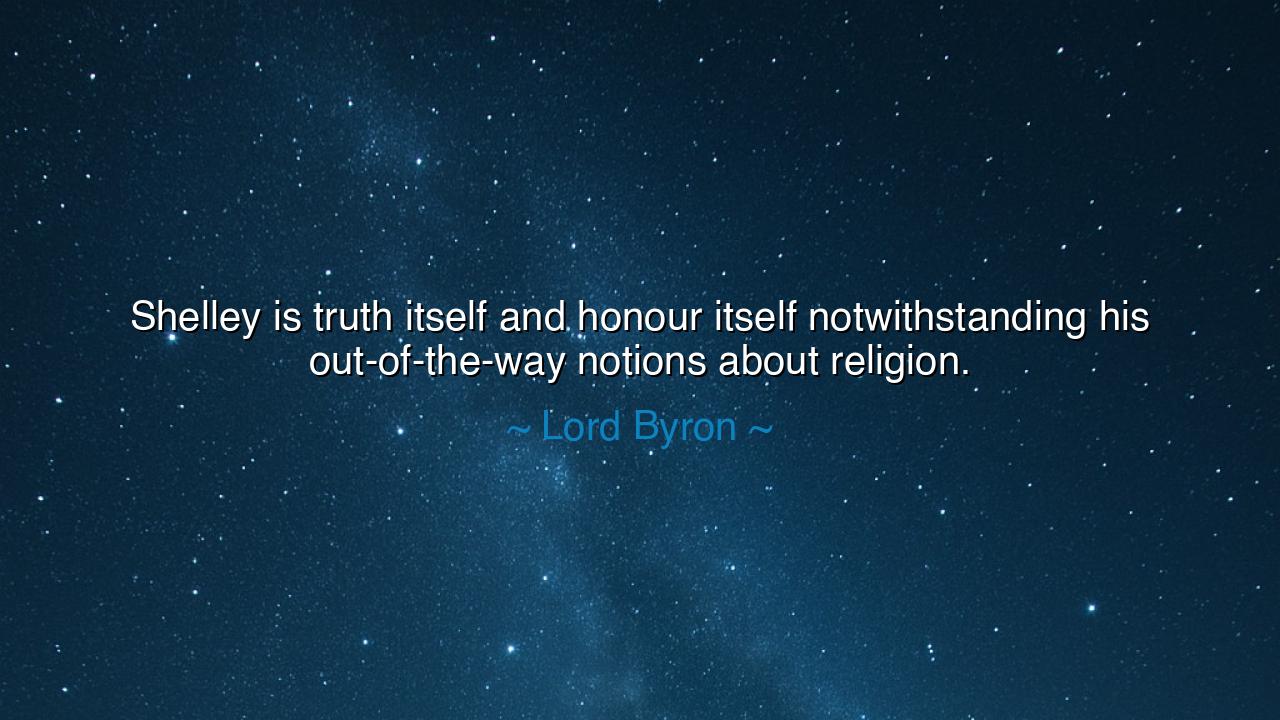
Shelley is truth itself and honour itself notwithstanding his
Shelley is truth itself and honour itself notwithstanding his out-of-the-way notions about religion.






Lord Byron, the fiery spirit of the Romantic age, once said of his friend and fellow poet: “Shelley is truth itself and honour itself notwithstanding his out-of-the-way notions about religion.” In this statement, Byron lifts high the character of Percy Bysshe Shelley, affirming that though his views on religion were controversial, even scandalous in their time, his soul was nevertheless pure in its devotion to truth and unwavering in its sense of honour. Byron reminds us that a man is not defined by conformity to accepted creeds, but by the integrity with which he lives his convictions.
The ancients understood this distinction. Socrates, condemned by Athens for corrupting the youth with unorthodox ideas of the gods, was nevertheless a man of truth and honour. He drank the hemlock rather than betray his conscience, showing that fidelity to truth stands above the fear of death. In Byron’s words about Shelley, we hear the same echo: a man’s worth lies not in whether his beliefs match the common crowd, but in whether he is faithful to his inner compass of honesty and justice.
Shelley himself embodied this tension. He defied the religious conventions of his day, questioning doctrines that others held sacred, proclaiming his disbelief in systems he saw as oppressive. For this, he was cast out, scorned, even branded immoral. And yet, in his personal dealings, he was known for his generosity, his loyalty to friends, and his tireless pursuit of justice for the poor and oppressed. Byron, who knew him closely, could therefore testify: though Shelley’s notions about religion were “out-of-the-way,” his life radiated truth and honour beyond dispute.
History abounds with similar figures. Consider Galileo Galilei, condemned for teaching that the earth moves around the sun. His ideas were deemed “out-of-the-way notions” by the authorities of his time. Yet today, we recognize his devotion to truth as heroic. Or think of Martin Luther, who defied the powers of his day for the sake of conscience. Again and again, history shows us that those who challenge accepted religious ideas may be misunderstood, but if their hearts are pure and their lives honorable, their legacy endures as one of greatness.
Byron’s words therefore carry a deeper meaning: they warn us against judging men by their creeds alone. To dismiss someone because their beliefs differ is to risk overlooking their nobility. Shelley may not have bowed to the altars of his time, but he bowed to truth, which is the highest altar of all. He may not have recited the common prayers, but he lived the prayer of integrity—loyal to friends, fierce for justice, unafraid of the world’s scorn.
The lesson for us is this: measure a man not merely by what he believes, but by how he lives. Truth and honour are higher than conformity. To walk in truth is to walk in the light, even if one’s path appears strange to others. To live with honour is to be steadfast, even when one’s ideas provoke ridicule. True worth is not in the approval of the crowd, but in the alignment of one’s life with sincerity, integrity, and love of justice.
Practical actions follow. Do not be quick to condemn others for beliefs that differ from your own. Look deeper—into their actions, their character, the way they treat their fellow man. Aspire to live in such a way that even those who disagree with your notions must still say of you: he is truth itself, she is honour itself. Let your life speak louder than your doctrines, your integrity shine brighter than your opinions.
O seeker, remember Byron’s tribute: Shelley is truth itself and honour itself. Let this be said of you, no matter what others think of your beliefs. Live so that your name is bound not to conformity, but to character. For in the end, religions rise and fall, creeds change with the winds of time, but truth and honour endure forever.






AAdministratorAdministrator
Welcome, honored guests. Please leave a comment, we will respond soon